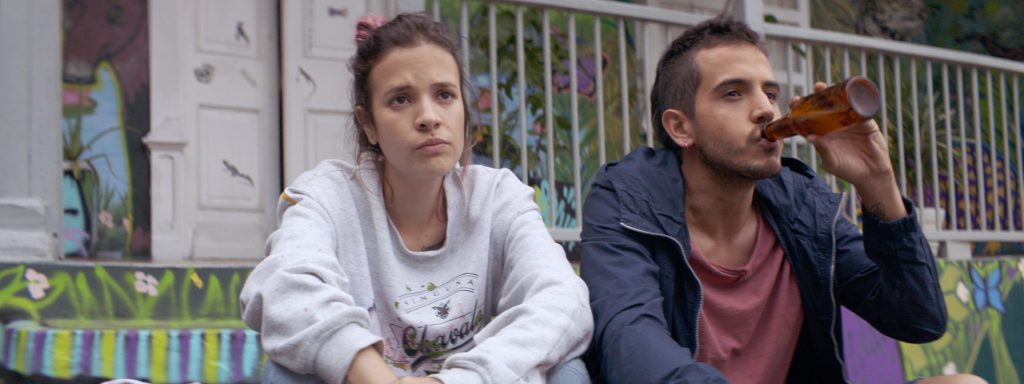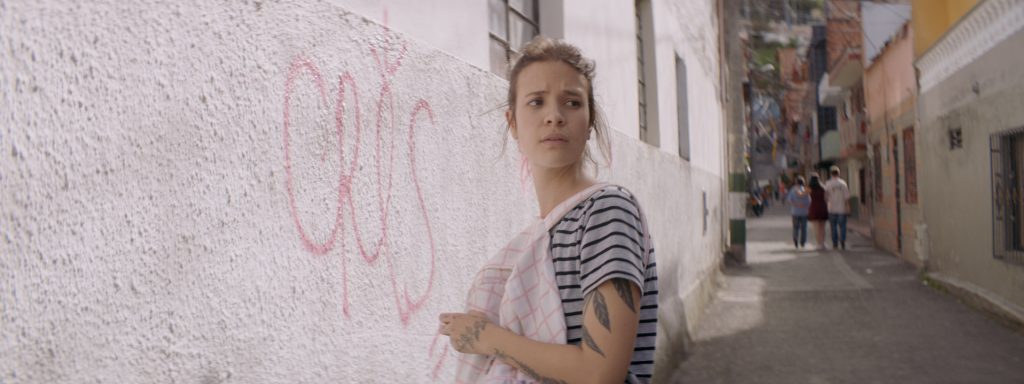Ana Cristina Velez Lopez, Carlos Andres Fonnegra, Catalina Arroyave, Christian Tappan Sorzano, Colombia, David Escallon Orrego, Days of the Whale, Diego Alejandro Samaca Garzon, drama, Julian Gerald Ruiz, Laura Isabel Tobon Ochoa, Margarita Celene Restrepo, Medellin, movies, Natalia Castano Farjado, reviews
July 25, 2020
by Carla Hay

Directed by Catalina Arroyave
Spanish with subtitles
Culture Representation: Taking place in Medellín, Colombia, the dramatic film “Days of the Whale” has an all-Latino cast representing the middle-class, the artistic class and criminal underground.
Culture Clash: Two young graffiti artists who are starting to fall in love with each other have their relationship tested when local drug dealers threaten their safety.
Culture Audience: “Days of the Whale” will appeal primarily to people who are interested in gritty yet heartfelt stories about young people involved in street culture.

The unflinching drama “Days of the Whale” (written and directed by Catalina Arroyave) takes a realistic look at what can happen to young love and artistic expression when crime and violence threaten to destroy them. This well-made movie has such authenticity to it and impressive naturalistic acting from all of its cast members, that “Days of the Whale” is the kind of narrative feature film that could easily look like it could be a documentary, if not for the fact that the criminals in the movie definitely wouldn’t have allowed cameras to film some of the scenes.
The main protagonists of the story are two graffiti artists in their late teens named Cristine, also known as Cris (played by Laura Isabel Tobón Ochoa) and Simón (played by David Escallón Orrego), who both love to spend their days creating illegal mural art on the economically deprived streets of Medellín, Colombia. Cris comes from a comfortably middle-class home, where she lives with her divorced father Julián, also known as Juli (played by Christian Tappan Sorzano), who worries about Cris hanging out in less-than-safe neighborhoods. Simón lives with his loving grandmother Dora (played by Margarita Celene Restrepo) in one of those neighborhoods.
Simón and Cris aren’t at home a lot because they’re either making art together or they’re hanging out at an old house called La Selva, which has become an open haven for local artists who are mostly young people. Cris is supposed to be enrolled in a local university, but she seems to be skipping classes and not doing any schoolwork. In fact, she’s been failing her classes and keeping it a secret from her parents.
The beginning of the movie starts out peacefully, as Cris and Simón find a young stray pitbull and bring it back to La Selva so that the group can help take care of the dog, which Simón has named Niche, after German philosopher Friedrich Nietzsche. Cris teases Simón that he’s gotten very intellectual.
Meanwhile, the area where La Selva is located is in a territory controlled by gang members whose primary way to make money is by dealing drugs. The gang members have made it clear that they want to control the neighborhood by demanding money from the locals if these innocent people don’t want to be terrorized by the gang. It’s an extortion racket that has its drawbacks, because some people start to incur a lot of debt, such as Lucas (played by Carlos Andrés Fonnegra), one of the older artists who hangs out at La Selva.
As an act of sarcastic rebellion, one of the La Selva artists has made an illustration that shows someone shot dead with this written warning: “If You Don’t Pay Your Protection Racket.” The members of the La Selva artist collective have a debate over whether or not it’s a good idea to include the illustration in a pamphlet of their art that will be distributed in the neighborhood. Someone remarks that the gang violence has gotten worse since that illustration was made. Meanwhile, someone has written this graffiti message on a nearby wall: “No More Prisoners at Home.”
It’s unclear how long Simón and Cris have been spending time together as friends, but there’s something about Simón’s past that Cris doesn’t know yet: He used to be in the gang that’s controlling the territory. One of the gang’s main enforcers is named Samacá (played by Diego Alejandro Samacá Garzón “Voltracks”), and he was a close friend of Simón’s in their childhood. Samacá has a thug sidekick named Duván (played by Julián Gerald Ruiz), who helps Samacá intimidate people in the neighborhood.
One night, Samacá has a private conversation with Simón to warn him not to snitch about what he knows about the gang. Samacá also somewhat taunts Simón for leaving the gang, by saying that Simón was foolish for choosing a life where he doesn’t make much money. Samanca tells Simón that if Simón had still been in the gang, he would have plenty of money and women and still have time to make art. Samanca also tells Simón that the only reason why he’s still alive is because Samanca respects Simón’s mother.
This conversation is an attempt to see if Simón will change his mind and come back to the gang, but Simón doesn’t take the bait. There’s underlying resentment that Samanca has in this dialogue with Simón, because even though Samanca exerts more power in the neighborhood, Samanca’s choice to be a gang member means that he doesn’t have the kind of freedom that Simón has. Simón doesn’t have to answer to anyone, and the worst crimes that Simón is committing these days are his graffiti activities.
But Samanca’s resentment toward Simón comes out in a threatening way when one day a message is scrawled on the wall directly across from La Selva: “Snitches Get Stitches.” That graffiti message is symbolic of the type of power that the gang has over the neighborhood. But how the people in the area react to this message is also a symbol of possible resistance to that power. The artists of La Selva have different opinions on whether or not to paint over this ominous message.
This pervasive threat of gang violence is the reason why Cris’ journalist mother Aura (played by Ana Cristina Vélez López) has left the area to live in Spain. Aura had written some scathing newspaper articles about gangs taking over certain areas of Medellín, with the articles questioning how effective law enforcement and the government are in handling the problems. Cris has saved clippings of her mother’s newspaper articles—an indication of how much she admires her mother.
Cris and Aura communicate with each other mainly through text messages and Zoom conference calls. Aura is eager to have Cris visit her in Spain, but so far, Cris has been reluctant to make those travel plans. And when Aura brings up the idea of Cris living permanently in Spain with her, it upsets Cris so much that she hangs up on Aura during a video conference call.
But Cris living at home with her father Juli isn’t exactly a tension-free environment. Juli’s girlfriend Valería (played by Natalia Castaño Farjado), who spends a lot of time in the home and who looks young enough to be Juli’s daughter, has been questioning Cris about why she never seems to do any schoolwork. Cris replies that a lot of her schoolwork is done online. When Valería mentions reading one of Aura’s newspaper articles, Cris snaps back with an insult by saying that she’s surprised that Valería can read.
Juli has also been noticing that Cris is spending less time at home, and he makes it clear to her that he doesn’t like it. However, since Cris is of legal age, there’s not much he can do about it. Juli tells Cris that he trusts her to know right from wrong.
Meanwhile, Simón and Cris become closer, as their friendship starts to develop into a romance. But their relationship doesn’t go unnoticed by jealous and paranoid Samanca, as he and Duván accuse Cris of being a possible snitch and they chase her down a street one day. Cris manages to hide in a building, but the experience has frightened her enough that she’s thinking about taking up her mother’s offer to move to Spain.
However, Cris is torn about moving to another country as she and Simón start to fall in love. It’s around this time that Cris comes up with an idea to paint a giant mural of a whale, which is her mother’s favorite animal because it’s a creature that is very protective of its young children. The mural is symbolic of several things in the story that become apparent to people who see this movie.
“Days of the Whale” is Arroyave’s feature-film debut. Her way of capturing Medellín street life in this movie is both raw and artistic. There’s a kinetic energy to the movie that is heightened by the ever-present threat of danger that could end in people being seriously assaulted or killed. As a newcomer to street culture, Cris represents someone who has to make some choices about what kind of community and lifestyle she wants to embrace. Her choices could affect the rest of her life.
And although it isn’t explicitly stated in “Days of the Whale,” Cris being a woman in the male-dominated world of graffiti art is also a statement about how she wants to be viewed by society, by not conforming to some of society’s expectations about women. The relationship that she has with Simón is respectful and almost sweet, but there’s also an unspoken question of how committed she really is to living the kind of street artist life that he’s been living longer than she has. Is she for real or just experimenting with rebellion?
The movie also creatively expresses the defiance that these artists have, because they have to do battle on a number of fronts—against police who might arrest them for their illegal graffiti; against the gangs who demand payouts that they can’t afford; and against society in general that expects them to get “real” jobs instead of doing the art that they love. “Days of the Whale” is a movie that won’t change the world, but it gives a fascinating and emotionally impactful peek into a world where people suffering for their art can have a life-or-death meaning.
Outsider Pictures released “Days of the Whale” in select U.S. virtual cinemas on July 24, 2020.
